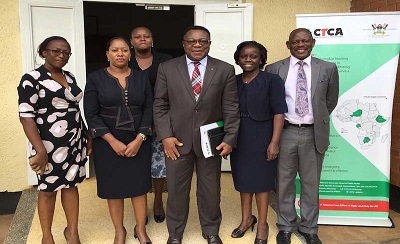
The African Capacity Building Foundation (ACBF) Executive Secretary, Prof. Emmanuel Nnadozie, paid a courtesy call to the Centre for Tobacco Control in Africa (CTCA) based in Kasangati, near Kampala in Uganda on 9 May 2016. CTCA with support from the African Capacity Building Foundation (ACBF) is rolling out a tobacco control project that seeks to build the capacity of select African governments in coming up with tobacco control policies in the next three years.
At the CTCA, Prof. Nnadozie was received by the Deputy Vice Chancellor, Finance and Administration at the Makerere University, Prof. Barnabas Nawangwe, who is also the chairperson of the CTCA Steering Committee.
In his welcome remarks, Prof. Nawangwe thanked ACBF for the support rendered to the Centre. He reiterated Makerere University’s commitment to ensuring that the Centre benefits the whole of Africa by supporting governments to implement evidence based tobacco control strategies.
Prof. Nnadozie stressed the need for strengthening capacity development for tobacco control leadership as a strategy to generate the much required political will to move the tobacco control agenda. He said tobacco use is a growing challenge affecting many Africans and yet still has a lot of capacity gaps that required concerted efforts to address.
The Acting Centre Manager, Ms. Jennifer Kalule highlighted some of the achievements that the Centre has attained during the phase II implementation that is supported through ACBF.
The project will address the inadequate capacity for tobacco control and will support governments in implementing evidence-based tobacco control strategies with an aim of reducing tobacco consumption in Africa.
In October 2015, at a meeting between CTCA and ACBF in Harare, Zimbabwe, the Foundation finalized on CTCA’s appraisal process by approving the project design. CTCA will implement the project in Botswana, Ethiopia, and Gabon, Niger and The Gambia and minimal support to ongoing work on tobacco control in Angola, Kenya, Mauritania, Uganda and South Africa.
Article and picture courtesy of the CTCA





